The Truffle Hunters is set to strike Oscar gold
The film focuses on the elderly men who secretly seek out the white Alba truffle, the world’s most expensive culinary ingredient in the Langhe region of Piedmont in northern Italy.
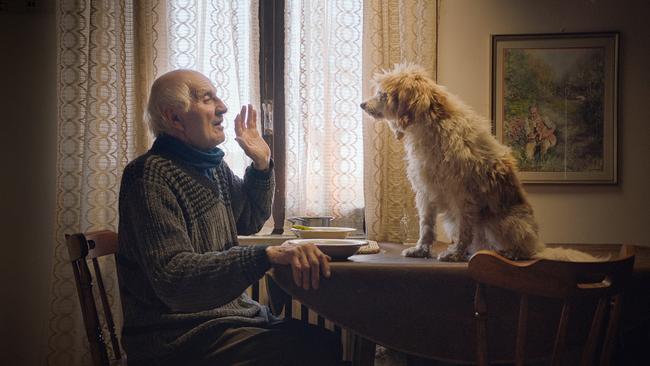
A film has to be something really special to lure us to the cinema in these pandemic times. With social distancing, mask-wearing and a diminished slate of blockbuster offerings, why go to the movies when streamers, by and large, bring the best of everything to the television screen increasingly at the same time as — or indeed instead of — it showing on the silver screen?
But then you have a film like The Truffle Hunters, selected for Cannes, Sundance, Toronto, nominated for a slew of awards and likely to become the frontrunner when the Oscar shortlist is announced in March. It is an originally-shot, joyful, transportive, poignant and charming, and important documentary. In the coming weeks it will be out in movie theatres in Australia and in case you need another reason to mask up and head out, it has 100% rating on the Rotten Tomatoes aggregator.
When The Truffle Hunters by New York directors Michael Dweck and Greg Kershaw premiered in the Sundance Festival’s World Cinema documentary competition last year it was an immediate hit.
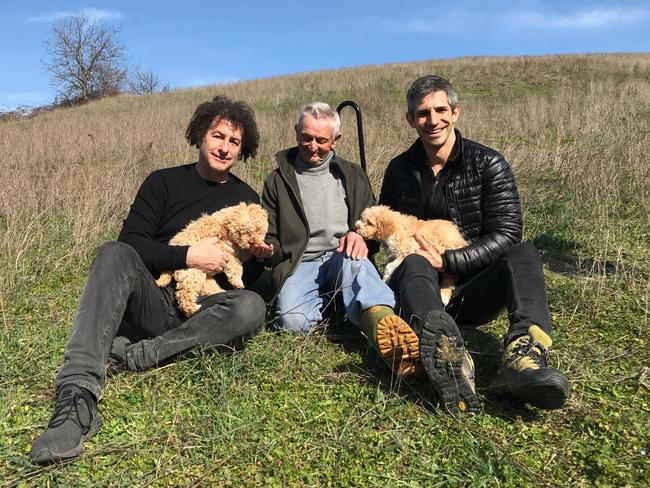
“The day before Sundance we were telling people how we were shooting it, like one shot a day and how we weren’t moving the camera and they said, ‘You can’t make a documentary like that,’” Kershaw told me during the Zurich Film Festival, where the film screened in October. “They thought we were crazy and certainly we had no idea the audience would appreciate it like we did. What was gratifying was that we could make a film following our instincts and showing the world we loved and that it could mean something to other people.”
The film focuses on the elderly men who secretly seek out the white Alba truffle, the world’s most expensive culinary ingredient in the Langhe region of Piedmont in northern Italy. The Alba truffle is like an endangered species given the increasing lack of oak trees, as they only grow on that tree’s roots, and only in a specific region. What Dweck and Kershaw discovered during their 15 trips to Italy over three years is that these salt-of-the-earth truffle hunters are an endangered species too.
The directors first met in Greenwich Village when they lived in the same Manhattan apartment block. “Our films are always about communities steeped in tradition,” Dweck explains, also referring to their previous 2018 Sundance feature The Last Race, which focused on stock car racing in Long Island — and how it has almost died out. Incredibly they learnt about the truffle hunters independently when they took separate holidays “to get away from it all” in northern Italy.
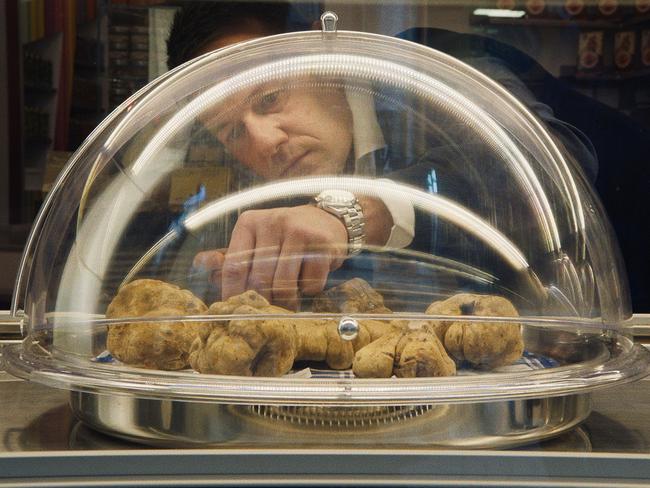
“There was this mystery in the truffle hunters’ world that intrigued us and ultimately provided us with an entry into finding a story,” Kershaw says. “What we were struck by in this area was a feeling of magic. It felt like you were moving through a fairy tale, a story book and then we would meet these characters. We met the local townspeople before we got to meet the truffle hunters, who were all great storytellers and had these incredible personalities. They seemed larger than life. We laughed a lot when we were shooting.”
They were intrigued by the relationships the men have with their dogs in the hunt. The dogs are mostly female. “We don’t know why they felt the female dogs had a better scent and could focus more and got less distracted,” Kershaw says. “In order to learn more about that relationship we attached a camera and tiny microphones to one of the dog’s heads. What came out of that were the conversations the truffle hunters had with their dogs when they stopped in the woods to sit on a rock. They would talk about their personal concerns, about how he met somebody he didn’t trust, or asking, ‘Who will take care of you when I’m gone because I don’t think I’m going to live much longer’.”
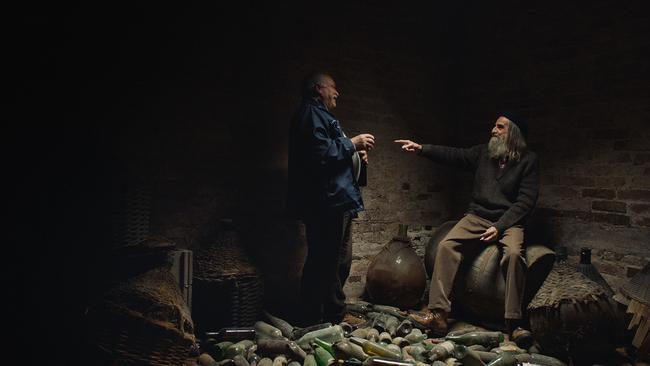
The directors also discovered the exquisite qualities of white truffles. “There’s a certain smell when you’re standing next to a wood fire — truffles have a perfume that’s unlike anything else,” says Kershaw. “We wanted to bring that into a cinematic experience.”
I tell them how I had experienced the delight of eating white truffles at an expensive French restaurant where shavings were placed on top of pasta.
“In New York we’ve had the opportunity to have truffles once in a while,” recalls Dweck, “but mostly it’s been dishes laced with truffle oil, which is a fake, chemical compound and doesn’t taste anything like a real truffle. Once we were immersed in this world we were hooked.”
Certainly the adventure of the chase proved exciting. They first went out with their camera on an all-night run with an 85 year-old. “There was mud, rain and it was freezing cold,” recalls Kershaw. “Finally in the morning he found a small truffle and we thought he’d sell it, as it was the first one he’d found in five days. But he took us to his little cabin, made a fire and lit the stove and took out a beautiful old frying pan, cracked some eggs and threw them in the frying pan and threw shavings of truffles on top. It was like him telling us, ‘Welcome into my family’ and it was our first breakthrough.”
One of the biggest surprises was the fitness of these octogenarians.
“We would go into the woods with 88 year-old Carlos and we would be running after him,” recalls Kershaw. “He moved so quickly. To be around people who were so old in years and so young in their bodies and spirits was inspiring.”
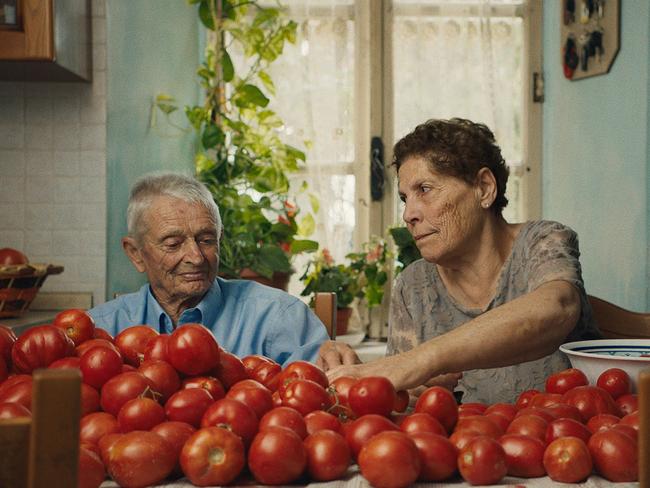
The secrecy of the hunters is another aspect that propels the narrative. In one scene a younger truffle hunter asks Aurelio to take him to his secret spots, but Aurelio is never going to give up the location, Kerhaw says. “The truffle hunters are eager to pass down the tradition, but they will never tell where their secret spots are. They will take them to their graves.”
The film presents a snapshot of a time gone by, before technology overtook our lives. The truffle hunters live without computers and smartphones. “They lead very simple lives, so close to nature and animals,” Dweck says. “It was really fulfilling, really refreshing. We couldn’t wait to come back each time.”
In making the Italian-Greek-US production the directors enlisted help and finance from 22 supporters via the Sundance Institute’s Catalyst program, which builds partnerships between independent investors and filmmakers. “We raised money through that group and grants helped us a lot,” says Dweck.
There was an urgency to capture this generation of men on screen. Most prominently Italian Oscar-nominated director Luca Guadagnino (Call Me by Your Name) came on board as executive producer. A great defender of his country’s traditions, Guadagnino recently made a wonderful documentary about Salvatore Ferragamo and his handmade shoes.
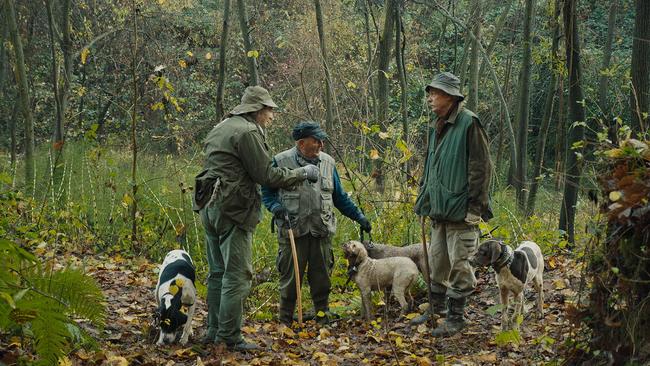
“We know that Luca has a direct interest in truffle hunting,” Dweck notes. “He’s bought a truffle hunting dog and some land in the truffle hunting region, so he wants to truffle hunt.”
“We were grateful to have Luca’s support, because he makes these beautiful, artful, daring films and he’s also able to find an audience to get them seen,” adds Kershaw. “There aren’t many people who can do the kind of work that he does at the level. He excites a global audience to come and see his movies.”
While Dweck and Kershaw have now managed to achieve that as well, they are keen to note that the film is not only about truffle hunting.
“There are so many subtle layers, about climate change and globalisation, that came out organically,” says Dweck.
He recalls how when a man felled oak trees after paying the landowner a mere 200 euros it seemed like a tragedy.
“We had a call from Sergio in the middle of the night. He was in tears, ‘they’ve cut down all my trees!’ But we were too late to do anything about it; the trees were already cut down. We have raised money via a program through a trust in the region, somebody we know who helped us with the film. We’re trying to prevent deforestation in the area, because we saw how fragile the land is.”
Still there’s rich truffle land that nobody knows about. “We’re acquiring land for the truffle hunters after picking out the land where we filmed. So they’ll have it forever. There’ll be an educational component to get the truffle hunters into schools to try to encourage young people to do it the right way, to respect the land, to respect nature and maybe put technology aside for a bit.”
Sony Classic Pictures’ The Truffle Hunters is in cinemas from February 18. Watch the trailer below.

To join the conversation, please log in. Don't have an account? Register
Join the conversation, you are commenting as Logout